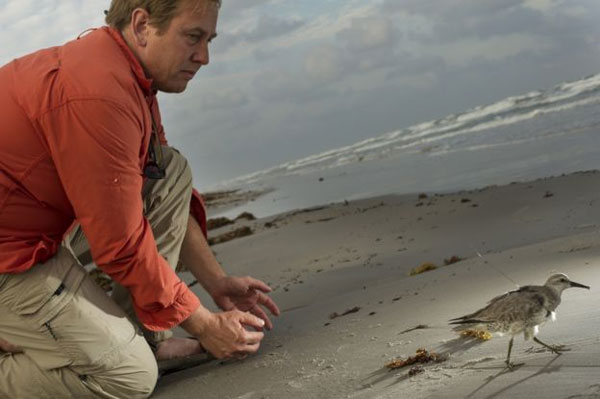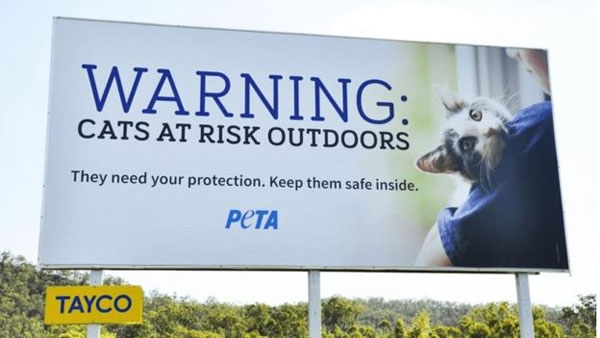[ad_1]
A small village on the southern coast of New Zealand is planning to implement a radical plan to protect its native wildlife: ban all domestic cats.
Under the initiative, proposed by Environment Southland, cat owners in Omaui will have to neuter, microchip and register their moggies with local authorities.
After their pet dies, cat lovers in the community will then not be allowed to get any more.
It sounds extreme, but it may be something more communities should be considering: after all, cats are responsible for the death of billions of birds and mammals each year – and, according to some, it is all our fault.
Dr Peter Marra, the head of the Smithsonian Migratory Bird Centre, has authored journals and books on the issue.
Contrary to preconceptions about him, he insists he is not anti-cat or against cat ownership.
“Cats make wonderful pets – they’re spectacular pets! But they shouldn’t be allowed to roam outside – it’s a really obvious solution,” he told the BBC.
“We would never let dogs do that. It’s about time we treat cats like dogs.”
In Omaui, officials say the measure is justified because cameras have shown roaming cats preying on birds, insects and reptiles in the area.
“So your cat can live out its natural life at Omaui happily doing what it’s doing. But then when it dies, you wouldn’t be able to replace it,” bio-security operations manager Ali Meade explained.
Under the plan, anyone not complying would receive a notice, before officials would remove the pets – but only as an “absolute last resort”.
The initiative is part of the regional council’s proposed regional pest management plan, which was opened for consultation on Tuesday.
John Collins, chairman of the Omaui Landcare Charitable Trust, championed the ban to protect “high-value” nature reserves there.
‘We’re not cat haters, but we want our environment to be wildlife-rich,” he said, the Otago Daily Times reports.
How big a problem are cats?
The debate about cat populations and local eco-systems is not unique to Omaui.
Conservation scientists have long warned about the impact of feral and outdoor cats on the global eco system – and they’ve been ranked among the 100 worst non-native invasive species in the world.
 |
|
Dr Marra believes cat-owners need to take more responsibility for their animals — Source: TIM ROMANO/SMITHSONIAN CONSERVATION BIOLOGY INSTIT
|
Dr Marra says 63 species extinctions around the world are now linked to the booming cat populations. The problem is exacerbated in areas with very sensitive eco-systems, like New Zealand.
“It sounds extreme,” he says. “But the situation has got out of control.”
He believes cat-lovers around the world need to embrace a “different mind-set” toward the animals. He believes they should be adopted where possible, then neutered and exercised at home using toys, or in a controlled environment – for example, on a leash.
“This predicament is not the fault of cats – its humans’ fault,” he insists.
Because of their popularity on social media and in memes, the global pet population shows no sign of abating.
“They are just cute – everything about them, which makes this whole thing more difficult.”
Accurate estimates are hard to ascertain, but in the US there are about 86 million pet cats – roughly one in every three households.
Unquantifiable amounts live stray or feral, meaning huge casualties in the environment.
It is estimated that as many as four billion birds and 22 billion mammals are killed by cats in the US every year.
Even in the UK, populations are on the decline, and experts blame cats. The Mammal Society says that about 55 million birds are falling casualty each year.
‘Natural-born killers’
It’s not the first time cats have been painted as a menace in New Zealand – a country boasting a feline in almost half its households.
They’re a hot issue in Australia too, where feral and outdoor cats are blamed for millions of native species’ deaths every night.
The nation has been funding grassroots culling initiatives since 2015, boasts the world’s largest cat-proof fence and has even considered introducing a national curfew for domestic cats.
Councils and state governments have been taking the cat problem into their own hands – forcing cats to stay indoors at night, implementing household quotas and mandatory identification and neutering.
Nevertheless, initiatives against felines remain controversial. Last year animal rights groups laid particular scorn at one Queensland local council who were offering $10 bounties for feral cat scalps.
 |
|
PETA Australia paid for billboards to warn of the risks after the local bounties were announced — Photo: PETA
|
In Omaui, residents told local media they were “shocked” and “hoodwinked” by the proposed ban and have vowed to resist it.
Nico Jarvis, a local resident who says her three cats help combat rodents in her house, compared the proposal to a “police state”.
”It’s not even regulating people’s ability to have a cat. It’s saying you can’t have a cat,” she told the Otago Daily Times.
Paw Justice, a New Zealand-based non-profit that focuses on animal abuse, posted about the plan on Facebook, questioning the evidence behind it.
Cat-lovers on the group’s Facebook page reacted angrily to the news and pointing out that poisons, cars and humans also damage native species.
Local residents have until the end of October to register their submissions to Environment Southland’s plan.
Source: BBC
[ad_2]
Source link
